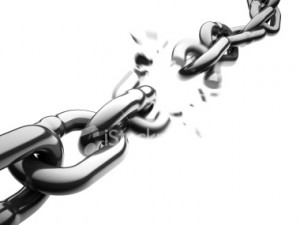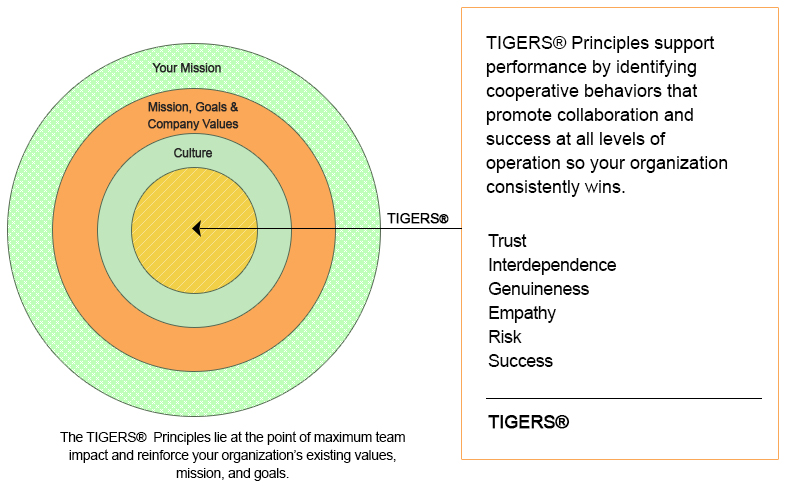 You’ve probably heard the term, a rolling rock gathers no moss. If that rolling rock had a label – rude behavior – this would not be true.
You’ve probably heard the term, a rolling rock gathers no moss. If that rolling rock had a label – rude behavior – this would not be true.
Rude behavior is sticky. It sticks to people like Velcro. Your good employees get stuck. Perhaps rude behavior was completely unjustified. This causes some people to harbor grudges and then act out passive aggressively. The net result is more rude behavior.
What this means is that one act of rude behavior, if unchecked, spreads to the department. Eventually rude behavior spreads to company and to customer service. When rude behavior is not stopped before it picks up speed the culture becomes toxic and your company culture rolls down hill. Perhaps your profits do too.
Our previous article, Stop Rude Behavior in its Tracks with TIGERS Group Behavior Norm Facilitation, dove into how rude behavior affects all facets of the organization. Rude behavior by leaders is a sign of poor group norms of behavior. We also found that rude behavior is actually contagious within the workplace, so if left unchecked, more employees within all levels of the organization will exhibit rude behavior. This causes rude behavior to spread even further.
This article will dive deeper into how rude behavior affects the workplace. When unchecked, sloppy behavior norms create toxic workplace cultures. One sure sign that your culture is in trouble is when you hear team members say “that’s not my job.” Sure, you hire employees for specific roles, and yes, they should be focused on completing their assigned tasks. But this statement points to a deep underlying issue with the workplace culture. If team members don’t view their mission as “we’re all in this together” and are unwilling to help others to reach their goals, then you need to take action to turn your culture around.
Train managers to be facilitators of high functioning teams
Many times, stellar employees are promoted into management positions based on their performance. Once they achieve the higher role, their performance begins to flounder. This could be because of lack of training. Or, perhaps the team member was terrific accomplishing their previous skills but are not suited for a people-management role. But before you fire your stellar employee turned struggling manager, invest in training. Leaders who are not trained to facilitate team dynamics will, at best, achieve so-so outcomes. This means that the team will more likely than not fall into conflict and poor behavior. The result is high employee turnover rates and an inability to retain top talent.
Leadership training that focuses on facilitating group behavior norms, group decision-making, problem solving and planning teaches managers how to implement change strategies and track progress to improve cooperation among employees and departments for high performance results. It also stops rude behavior among well-meaning people.
A TIGERS case study on rude behavior
Sometimes, toxic rude behavior is well hidden. Or the offender is in denial, making it difficult to address the underlying causes. This can be even more problematic when the problem is with top leadership.
TIGERS was recently called in to assess the culture of a company in the beverage industry. We found that one executive was able to hide very successfully while causing employee discontent in the workplace. He was good at influencing leaders above him. Under him, however, employees were unhappy. They were shut down and treated rudely when they offered suggestions that would make the division operate more efficiently.
This leader was hired by a fired CEO whose rude behavior was more visible. He worked well with that CEO because their personality and leadership styles were very similar: autocratic and non-inclusive. As a result, the problem was discovered when the company Board of Directors invested in the TIGERS Workforce Behavioral Profile(TM) and expanded it to include individual department reports. The Board President was able to see why four of the six TIGERS principles required for high performance work groups were impacted. Rude behavior impacts risk resolution, empathy, genuineness and eventually trust.
When a Vice President acts rudely, it sticks to everyone that Vice President is responsible for. Once exposed, it is an excellent opportunity for the leader to receive executive leadership coaching that eventually corrects their career. The choice not to be coached or to change is then proof that this leader must go.
People who contribute to a toxic workplace can be given the coaching opportunity to change. But for Boards of Directors and business owners who are transforming the work culture to be more cooperative, better at problem-solving and in producing innovations, they need to be able to remove boulders from the road.
If the toxic leader is a family member of the business owner and owns a stake in the organization, then their influence over others must be “caged.” This means they are taken off a management position and placed into work assignments where they work alone or report to a group that someone else is leading.
Intermittent rude behavior and the statement “that’s not my job” may seem harmless at first. These behaviors, however, are a cause for concern for leaders. Rude behavior can point to underlying discontentment. It can also be a sign of a toxic workplace culture.
A toxic culture can stem from many different issues. Behavior arising from poor group behavior norms is one cause. Gone unchecked, rude behavior spreads. It results in a toxic work environment for employees at all levels of operation. To combat this behavior, managers require training in leading people. When leaders take accountability for their actions and their workplace culture, team members are able to thrive on all levels.
Care to dig deeper into this conversation?
Check out the following to add to the conversation:
- Stop Rude Behavior in its Tracks with TIGERS Group Behavior Norm Facilitation
- Warning Signs of a Toxic Culture
- Do Organizations Have a Teamwork Problem?
- TIGERS Manager as Facilitator Training
- TIGERS Workforce Behavioral Profile sample report
Copyright TIGERS Success Series, Inc. by Dianne Crampton
About TIGERS Success Series, Inc.
 TIGERS® Success Series provides a comprehensive, multi-pronged and robust system for improving both your work environment and profitability.
TIGERS® Success Series provides a comprehensive, multi-pronged and robust system for improving both your work environment and profitability.
We specialize in training your managers in group facilitation methods that build workforce cooperation and high performance team dynamics. Scaled to grow as your organization and leadership performance grows, our proprietary Team Behavior Profile and Management training workshops are based on the six principles we have found to be the right mix to make this happen.
The TIGERS 6 Principles are Trust, Interdependence, Genuineness, Empathy, Risk and Success. Born from our many years of business, psychology, and educational group dynamic research, and subsequent four years of independent evaluation, we instill and sustain behaviors that improve work group performance and talent retention for measurable ROI.
TIGERS serves committed leaders who desire enhanced cooperation among departments, teams, managers and individual employees. This heightened level of cooperation leads to improved revenue, purpose, commitment and impact. Employees quit companies because they don’t get along with leaders and co-workers. Work culture refinement and behaviors that build strong relationships erase this trend in fully measurable ways.
For more information or to request a presentation to your group or association, call 1+877-538-2822.